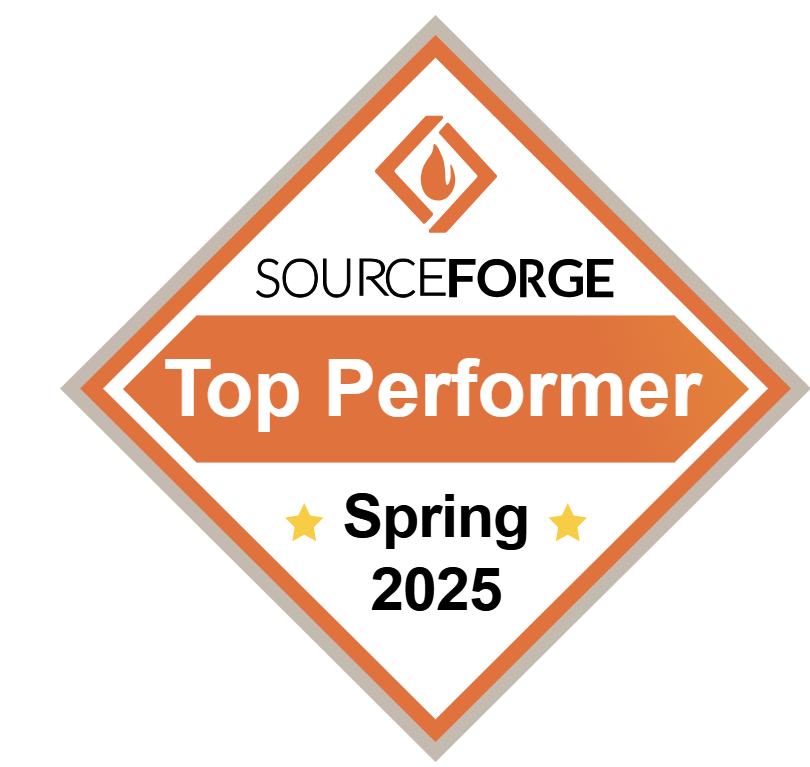- Blog
- 33 Newsletter Ideas & Examples to Engage Your Readers in 2025
33 Newsletter Ideas & Examples to Engage Your Readers in 2025
-
Nikolett Lorincz
- Marketing
- 6 min read
Table of Contents
Email marketing is 40 times more effective than channels like social media for acquiring customers. So, if you want to boost sales and build a business for the long term, you need a compelling company newsletter.
But you can’t send just anything to your email list and expect engagement. After all, competition is fierce in your customers’ inboxes.
If you want your messages to stand out from the crowd, you need fresh, creative newsletter ideas. Most importantly, you need to offer your subscribers valuable content in each and every newsletter.
Whether you’re giving them a behind-the-scenes look at how your products are made or a preview of your latest blog post, remember that access to free resources and inspiring stories will encourage subscribers to keep opening your emails…and keep engaging.
And that’s exactly why we put together this guide.
Whether you’re starting your newsletter from scratch or want to liven up your current campaigns, we’ve got you covered with great newsletter ideas that your target audience will connect with.
Let’s get right into it!
21 evergreen newsletter ideas
We get it: coming up with newsletter topic ideas can be exhausting.
The good news is that brands have tons of freedom when creating a newsletter.
Consider this: the “optimal” frequency for sending email newsletters is between twice per week and once a month.
Although the holiday season and other major retail holidays (think Christmas, Black Friday, and Memorial Day) are ideal times to engage your list, they shouldn’t be the only time you reach out.
Likewise, not every email newsletter needs to offer a deal. Some of the most effective newsletter ideas are focused on building customer relationships rather than revenue.
To kick things off, here are some fun newsletter content ideas you can roll out year-round.
1. Weekly industry news roundups
Instead of selling to your subscribers, you can keep them in the loop and grab their interest with breaking headlines, industry news, or a monthly business recap, like Ahrefs does in its roundup newsletter.
You want to present your newsletter as a valuable resource that reveals industry secrets or shares mind-blowing stats that your target audience wouldn’t be able to find anywhere else.
Finally, you can always keep things fresh with guest posts by industry experts.
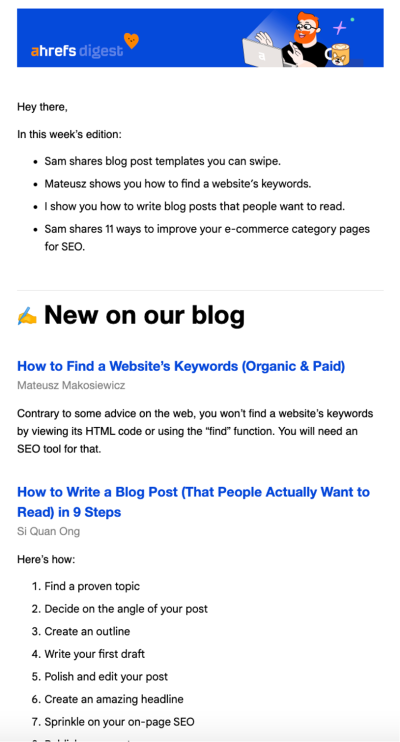
2. Share how-to guides or blog posts
How-to guides are ideal for any ecommerce business.
They allow you to double-dip your content and show off your products in action. By combining generative AI and human expertise, you can easily repurpose a “how-to” blog post for valuable newsletter content, including older blog posts your subscribers might not have seen.
For example, a fashion brand might center its newsletter around a seasonal buyer’s guide (e.g., “How to create the perfect fall outfits”).
Here’s an example from Methodical Coffee sharing their latest blog posts about how to enjoy black coffee:
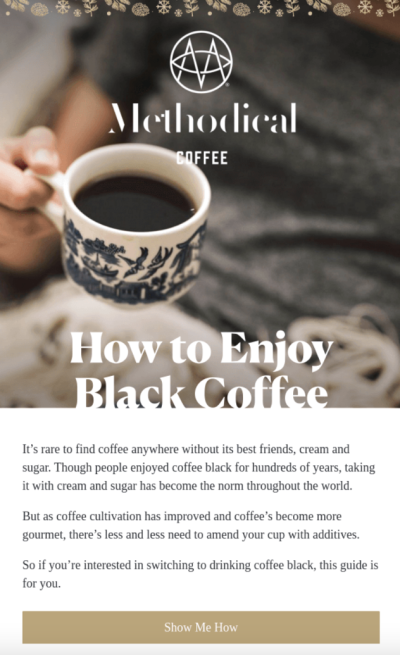
3. Share infographics
55% of people prefer to read messages in color versus messages without color.
Don’t send emails that are just a wall of text… infographics are all the rage on social media, and they’re also a great newsletter idea to break up the monotony of what people typically see in their inboxes.
Free tools like Canva, Visme, Venngage Infographic Maker, and Renderforest make putting together your own graphics effortless.
Check out this great newsletter content from Fellow:
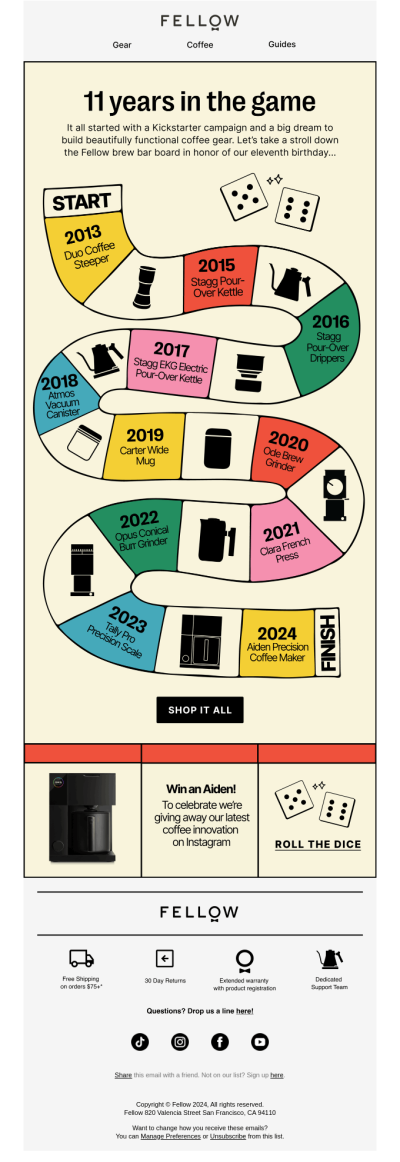
4. Share customer reviews
If you have positive customer feedback and glowing reviews from your existing customers, don’t keep them to yourself!
Reviews serve as social proof and work brilliantly to win over skeptical buyers. Don’t be afraid to ask for customer feedback and feature it proudly in your company newsletter.
User-generated content is always a hit because it makes your subscribers feel like they’re part of a community.
Here’s some inspiration from Warby Parker:
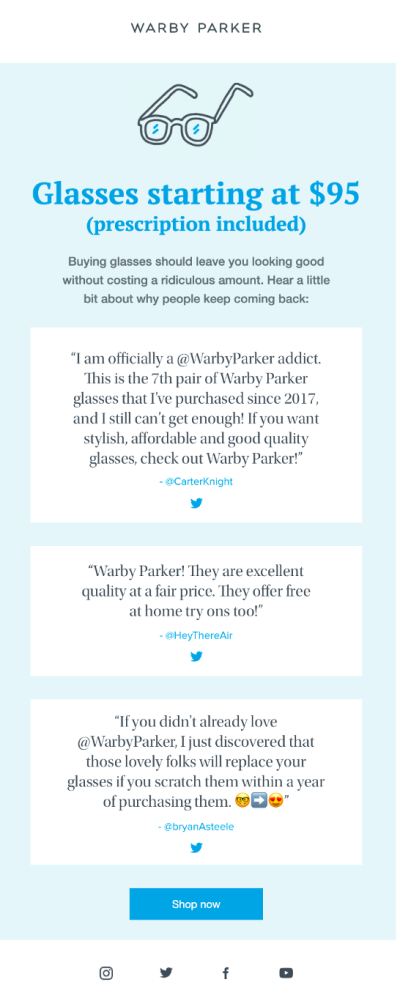
5. Ask for feedback with a poll or survey
Question-based newsletters serve as a natural invitation to engage… especially when there’s a chance to win something!
Picking your subscribers’ brains directly is one of the best ways to figure out exactly what people want to see from you in terms of offers and emails, as well as how your products and customer support are functioning.
Your whole team will be happy to receive valuable feedback about how they’re doing.
Check out this example from Lyft:
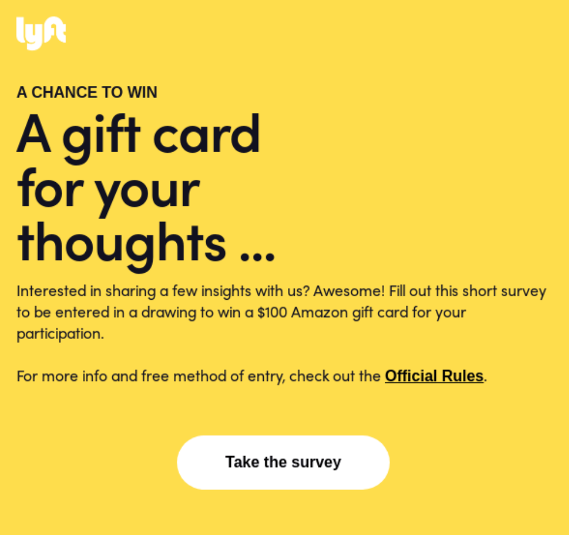
6. Offer special coupons
Spoiler alert: it’s okay to delight your customers with an offer or coupon “just because!”
Digital marketing doesn’t need to be complicated.
Warby Parker offers a special discount for new customers:
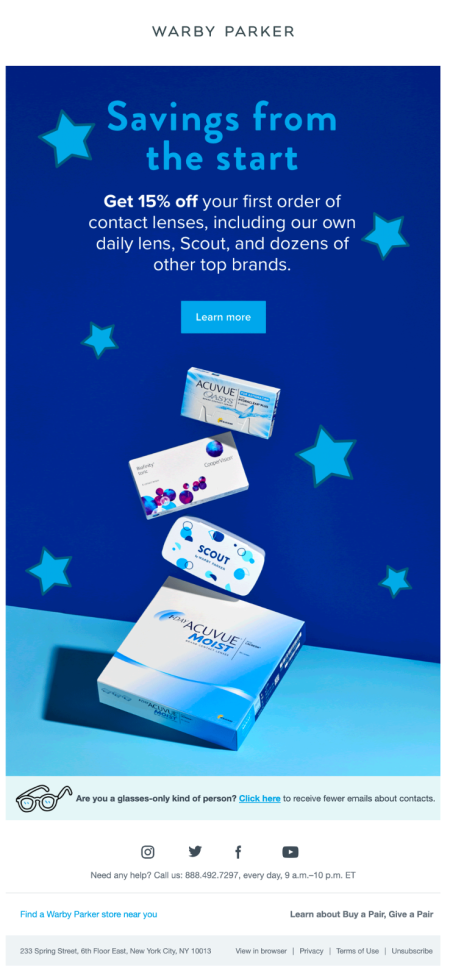
7. Product of the week or new arrivals
Sometimes shoppers need a nudge to make a purchase. Featuring a weekly product or bestseller as part of your newsletter helps subscribers avoid analysis paralysis when shopping.
Another product recommendation strategy is to highlight your new arrivals, like Urban Outfitters does in this newsletter:
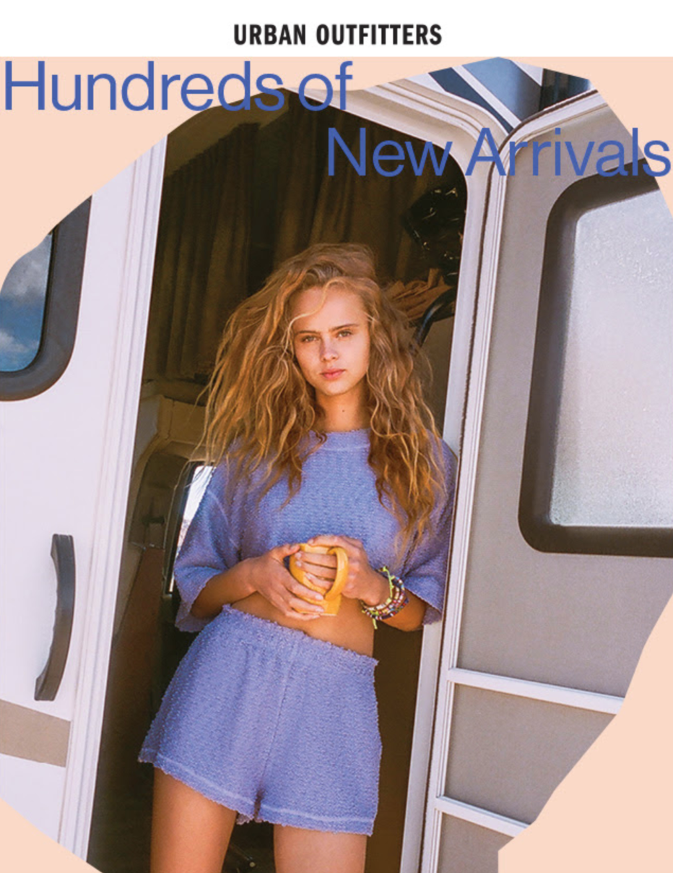
8. Community member of the week
Whether it’s a customer or team member, showcasing the human side of your company is a great way to build relationships with your audience.
A feel-good success story helps readers connect to your company on an emotional level.
9. Product FAQs
An email is a great way to answer frequently asked questions about your products and services.
The friendly, accessible format helps ease shoppers’ minds and gives you an opportunity to highlight the benefits of what you’re selling.
And, of course, your customers will appreciate any helpful tips you can offer about how to get the most out of your products.
So it’s a win-win strategy.
For inspiration, take a look at Peloton’s email:

10. Upcoming events
Whether you’re planning a future sale or a product release, your newsletter is the perfect place to hype up any virtual events you have in the pipeline.
This can be anything from an upcoming webinar to live YouTube videos.
Here’s a great example from Treehouse that promotes an upcoming event:
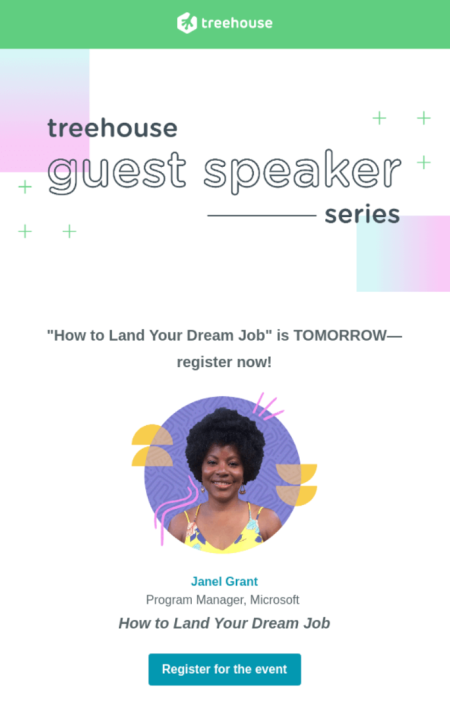
11. Promote new features and teach readers how to use them
New features or services can be a great reason to send a newsletter—both for ecommerce stores and SaaS companies.
It’s an opportunity to share all the details about your exciting new feature and get subscribers pumped up about it.
Check out how ecommerce business Happy Box promotes their new “virtual message” option in an email:
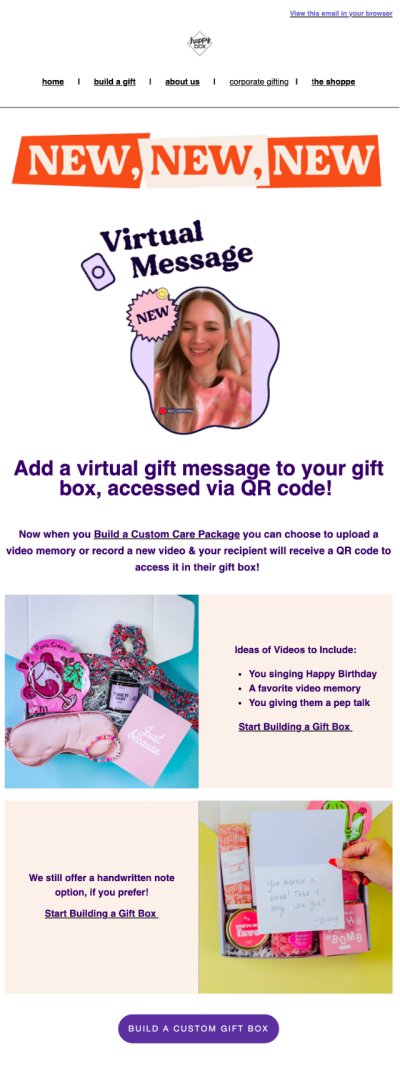
12. Highlight your loyalty program
Sending a newsletter about your loyalty program helps to increase awareness and can encourage customers to spend more in your store.
Here’s another example from Happy Box:

13. Curate content from other blogs
This could be a great strategy if you don’t have your own blog. You can gather blog posts that you’ve recently read and that you think will interest your readers, and send them out in a newsletter.
Check out how Ahrefs has a “What we’re reading” section in its weekly digest.
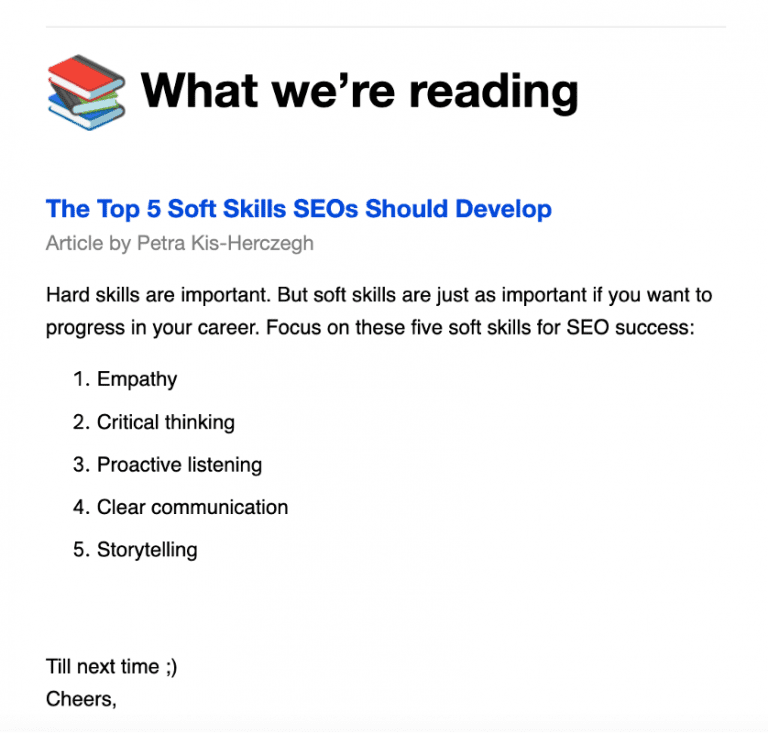
14. Make your newsletter funny
Adding a funny edge to your newsletter content can help engage readers. Subscribers connect really well with humor, since it’s different from what they usually see from businesses.
Check out how Quip uses tongue-in-cheek humor to encourage people to gift a toothbrush as a Valentine’s Day present to their significant other in their newsletter.
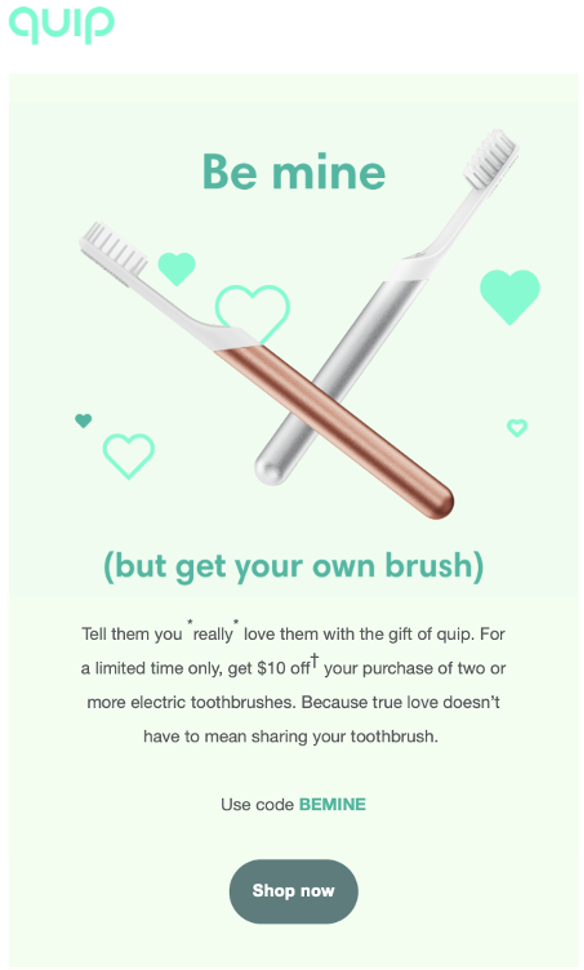
15. Share user-generated content
Content that your customers share with you or on social media feeds can be a great addition to your email marketing arsenal.
Choose content that offers social proof, raises valid concerns that you can respond to, or encourages other customers to join the conversation.
16. Leverage video content
Adding a video can significantly elevate your newsletters. You could share a quick how-to video, introduce a new product, or even give a behind-the-scenes look at your team.
Videos are a great way to make your content more engaging and dynamic, keeping your readers interested and coming back for more. Plus, it works well in both B2B and B2C communications.
Take a look at our own newsletter to see how we share our new YouTube videos:
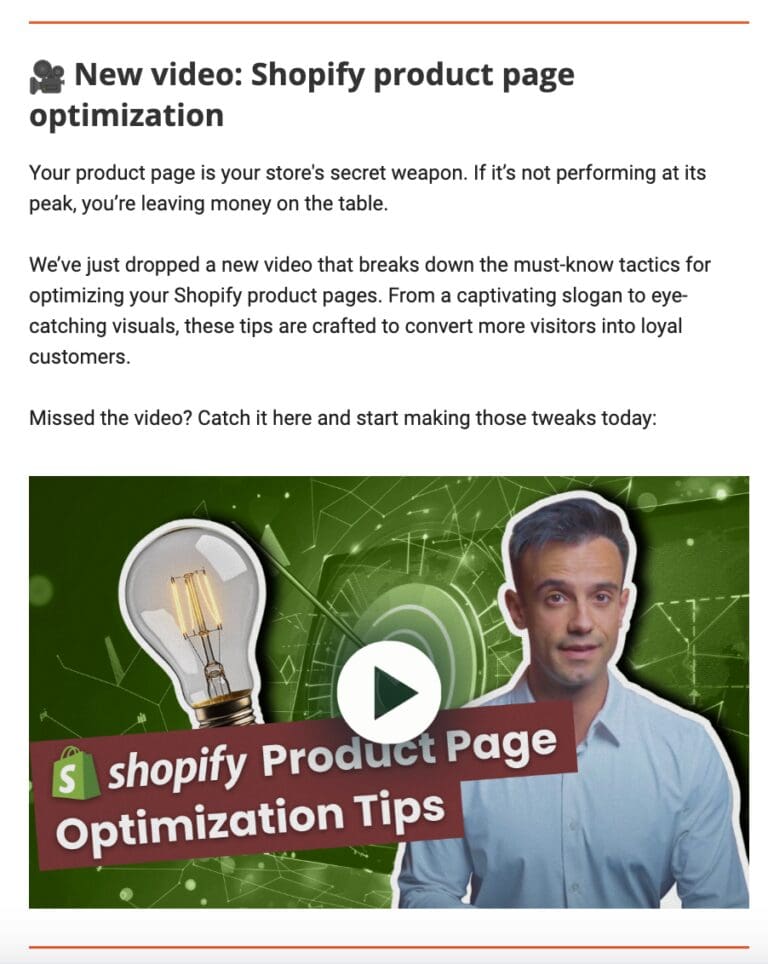
17. Share personal stories or lessons learned
To build stronger connections with your readers, share a personal story, the company’s history, or a lesson learned. It could be about a challenge your company faced or even a mistake you learned from.
This creates a sense of authenticity and relatability, which can foster trust and loyalty among your audience. Personal stories are also a great way to humanize your brand.
18. Offer an actionable challenge
Create an engaging and interactive experience by offering a challenge for your readers.
This could be a productivity hack for the week, a creative task related to your industry, or even a social media challenge.
A call-to-action like this encourages readers to participate and share their results, boosting engagement and building a community.
Check out how Open used this newsletter idea:

19. Highlight award nominations or wins
Showcasing your company’s award nominations or wins is a powerful way to build credibility and trust with newsletter subscribers.
Whether it’s an industry accolade, customer service recognition, or innovation award, sharing these achievements with your audience can make a big impact.
This newsletter idea focuses on highlighting your expertise, growth, and success. Plus, it’s a great way to show appreciation for your team’s hard work. Don’t forget to include visuals like badges or certificates to make the recognition stand out!
20. Share open positions for hire
Promoting open positions in your newsletter can attract top talent and keep your audience updated on your company’s growth. Briefly describe the roles, key responsibilities, and why your company is a great place to work.
Encourage readers to either apply themselves or share the job postings with someone they know.
This helps fill vacancies and builds a sense of community and inclusion among your subscribers, showing that your business is constantly evolving.
Check out this example from Social Print Studio:
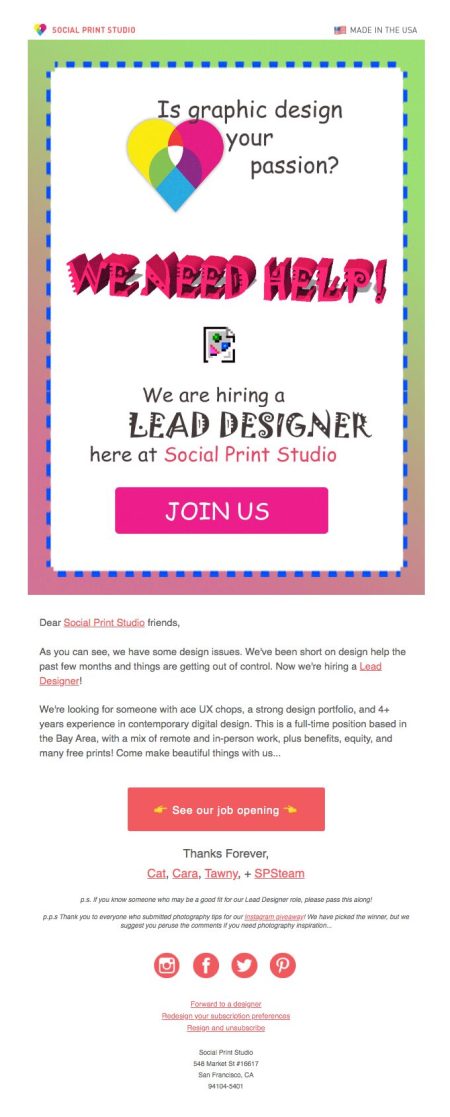
21. Showcase social media highlights
Featuring your best social media posts in your newsletter is a great way to keep subscribers in the loop and drive more engagement across platforms.
Share popular posts, behind-the-scenes content, or customer shoutouts to create a connection between your social media presence and your email audience.
This can also encourage newsletter readers to follow your profiles for more updates.
These evergreen newsletter ideas represent a solid starting point for just about any ecommerce brand looking to fill their content calendar.
Now, let’s move onto the seasonal newsletter ideas!
12 seasonal newsletter ideas
For the rest of this article, we’ll focus on newsletter themes that are more seasonal.
There are lots of important periods throughout the year when it’s important to drive more traffic to your site.
22. Inspire subscribers with New Year’s resolutions
The new year means shoppers focus on self improvement and starting over. Think about how you can give your newsletter subscribers a helping hand in reaching their goals.
For example, fitness and fashion brands use this time to encourage readers to invest in themselves. Positive language and reinforcement sets the right tone for these campaigns and makes your business feel more human.
Below is an example from Zumba. The “New Year, New Career” tagline is bold, but the steep 50% discount is all the more incentive for subscribers to take action ASAP.
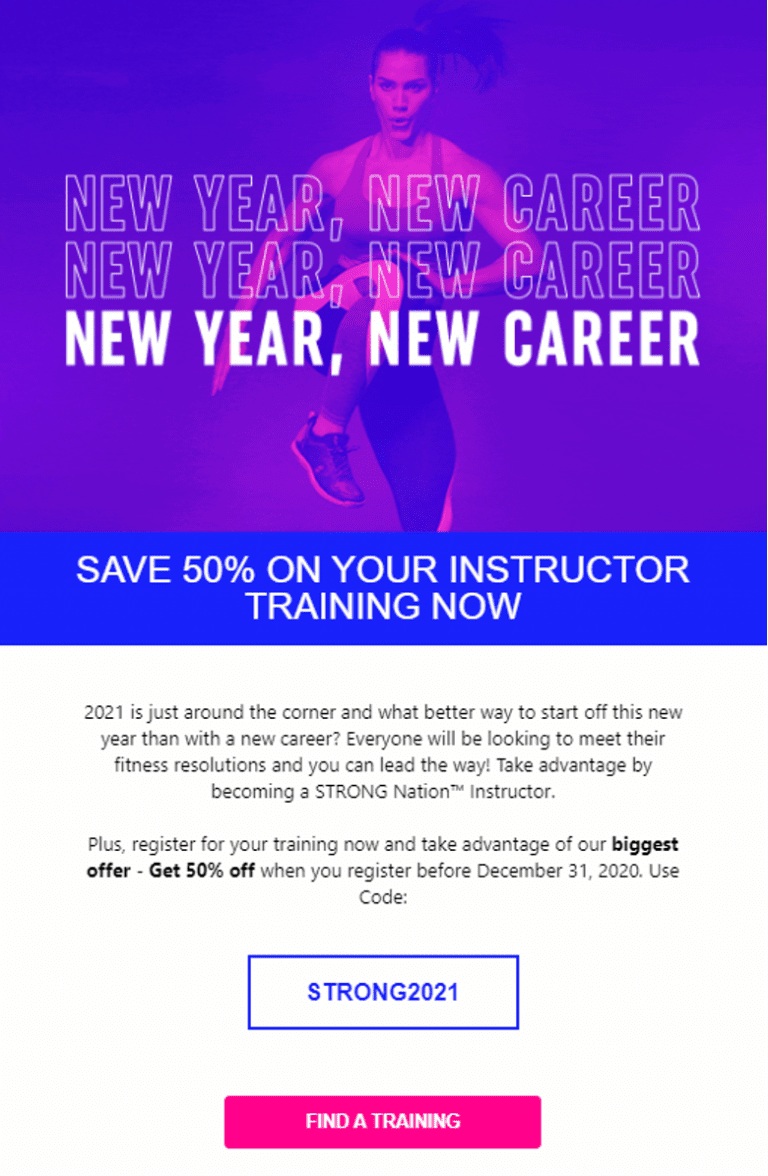
23. Win your newsletter subscribers over with a Valentine’s Day offer
Valentine’s Day (February 14th) remains a staple holiday for ecommerce. It’s a great chance to show your customers some love.
Heartfelt messages, “his and hers” deals, and red imagery are all ideal here. Need some extra inspo? Check out these 15 Valentine’s Day newsletter ideas.

24. Wish your subscribers a Happy St. Patrick’s Day
St. Patrick’s Day (March 17th) is famous for shamrocks, plenty of green, and lots of beer.
Here’s your chance to get festive and play around with your traditional company colors by featuring some green in your promotions.
Below is an example of a St. Patrick’s Day email that incorporates some great humor and clearly reflects the spirit of the holiday:

25. Get playful with an April Fool’s Day promotion
April Fool’s Day (April 1st) is popular among marketers, but it can be tricky to plan a campaign around.
That’s because brands big and small try to prank their customers… many of whom already see it coming.
Don’t try to bait and switch or confuse your subscribers. Instead, use April Fool’s Day as an opportunity to inject some humor into your campaigns (because that’s what customers expect).
Also, you might consider not trying to trick your customers, which is how some brands capitalize on the holiday (see below):
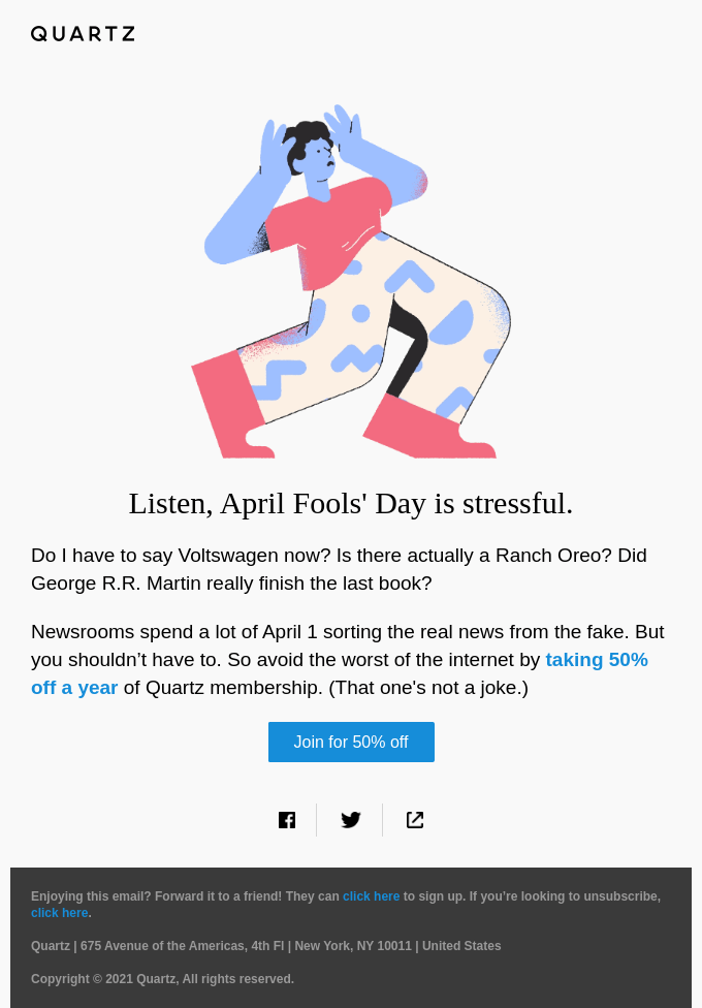
26. Hype up a Cinco de Mayo celebration
Cinco de Mayo (May 5th) is a celebration of Mexican culture that typically features plenty of bright imagery.
But let’s be clear: the holiday is about much more than tequila. If you decide to hold a Cinco de Mayo promotion, consider using tasteful text and thoughtful design that explains the significance of the day along with your promo.
Here’s some newsletter inspiration from Bloomingdale’s:
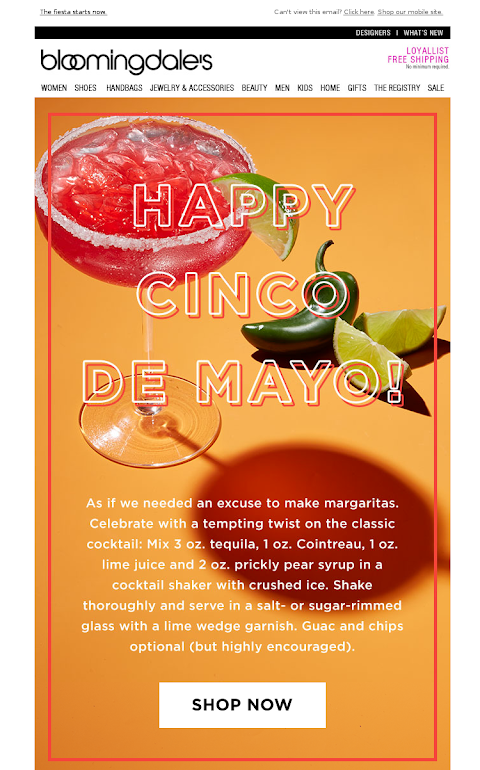
27. Share a Mother’s Day gift guide
Fact: gift spending for Mother’s Day hit a record high of $28 billion in the United States.
See why it’s worth hyping up your Mother’s Day deals in advance? Shopping guides, recommendations, and must-have deals help entice shoppers who are looking to show Mom some love.

28. Celebrate Father’s Day
Father’s Day (the 3rd Sunday in June) might not match the spending power of Mother’s Day, but it’s a staple ecommerce holiday nonetheless.
Heartfelt images and dad jokes are totally fair game here.
Many Father’s Day campaigns actually capitalize on the fact that the holiday is often glossed over (see below):

29. Show off your Independence Day pride
The Fourth of July is the quintessential American holiday. Just like on Memorial Day, USA-themed imagery is front and center, but Independence Day is definitely a more lighthearted affair.
Help your promotions hit the right mark by focusing on the great American outdoors, traditional pastimes like fireworks and s’mores, and general patriotic pride.
30. Run a back-to-school marketing special
As the school season starts up again, think about promotions and products to help your customers adjust to the transition (think: new outfits or gear).
The start of fall represents a new chapter for many of us—whether we’re headed back to work or sending our little ones back to school.
It’s the perfect time to transition from bright summer colors to a more fall-centric color scheme.
31. Put together a Labor Day campaign
Fact: spending for Labor Day (the first Monday of September) surpassed $2.6 billion in 2021.
It’s another huge day for retailers, and the holiday typically incorporates US imagery, steep discounts, and multi-day sales.
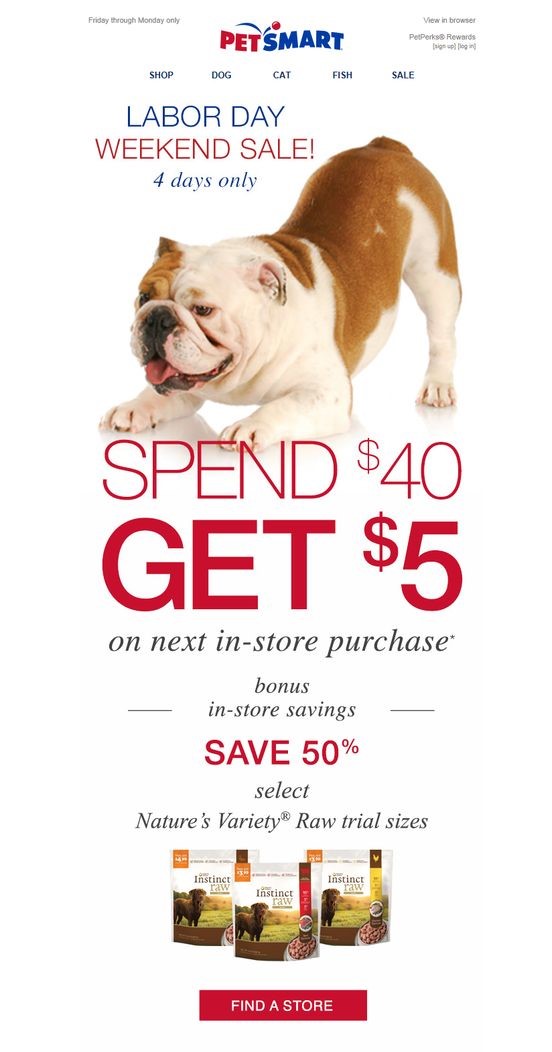
32. Run a Thanksgiving campaign
Thanksgiving falls on the 4th Thursday of November.
Although Thanksgiving signals the beginning of the holiday shopping sprint in the United States, don’t make the mistake of making your Thanksgiving promo too sales-focused.
Instead, use warm, gratitude-filled copy and make a point to show your customers some appreciation.

33. Help your customers choose the perfect holiday gifts
Christmas and Hannukah both fall in December, which means it’s prime time for gift shopping!
For all the customers who didn’t take advantage of your Black Friday sales (and even for those who did), it’s worth taking some time to highlight unique gift ideas or put together a gift guide.
Think of December as a sort of “shopping spree”—rather than focusing on a single day (or event), try to help your customers choose products their recipients will love all month long.

How to build your email marketing list (and bring your newsletter ideas to life)?
Your newsletter takes time and effort—so why not grow your audience to make it count? A bigger, engaged email list means higher engagement and more sales.
1. Use popups to capture subscribers
Popups are a powerful tool for turning visitors into subscribers. When someone signs up, they’re expressing interest, which increases the chances they’ll engage and make a purchase.
For instance, Mott & Bow offers $26 off and free shipping as an incentive for new email subscribers.
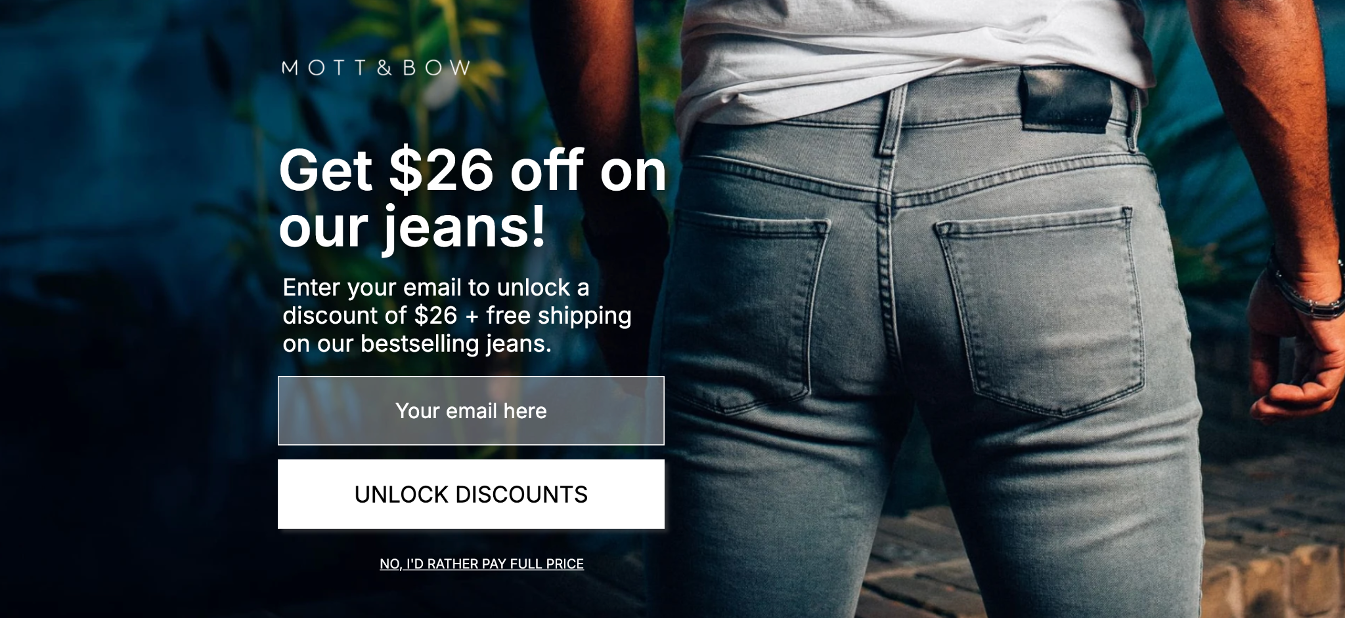
2. Offer value beyond discounts
Not a fan of offering discounts? No problem—there are plenty of other ways to encourage sign-ups while still providing value.
- Freebies – Offer downloadable eBooks, reports, or guides packed with useful insights. These work especially well in industries where education is key.
- Exclusive Access – Give subscribers first dibs on sales, product launches, or premium content that isn’t available to the public.
- Webinars & Communities – Host live sessions, Q&As, or private groups where subscribers can connect, learn, and engage with your brand.
Here’s an example from Turmeric, which offers a recipe book in exchange for email subscriptions.
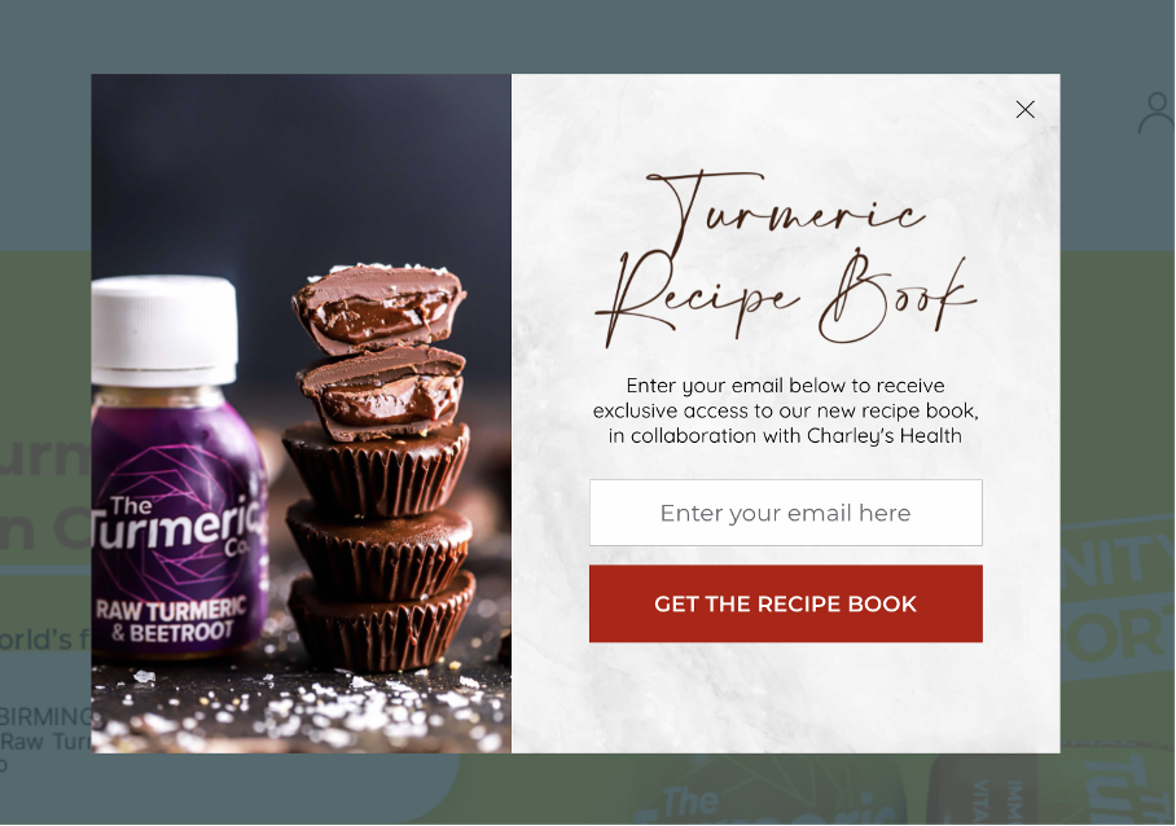
Get started with these templates now:
3. Optimize your website for more sign-ups
Your website is prime real estate for capturing email subscribers, so every opportunity should be maximized. Placing email list sign-up forms in strategic locations—such as the homepage, about page, blog sidebar, and checkout pages—can significantly boost your list.
Testing different calls to action (CTAs) can also make a big difference in conversion rates. For example, “Subscribe Now” might not be as effective as “Get Exclusive Tips.”
Here is an example from MFMG Cosmetics, and their CTA button “Try your luck”.
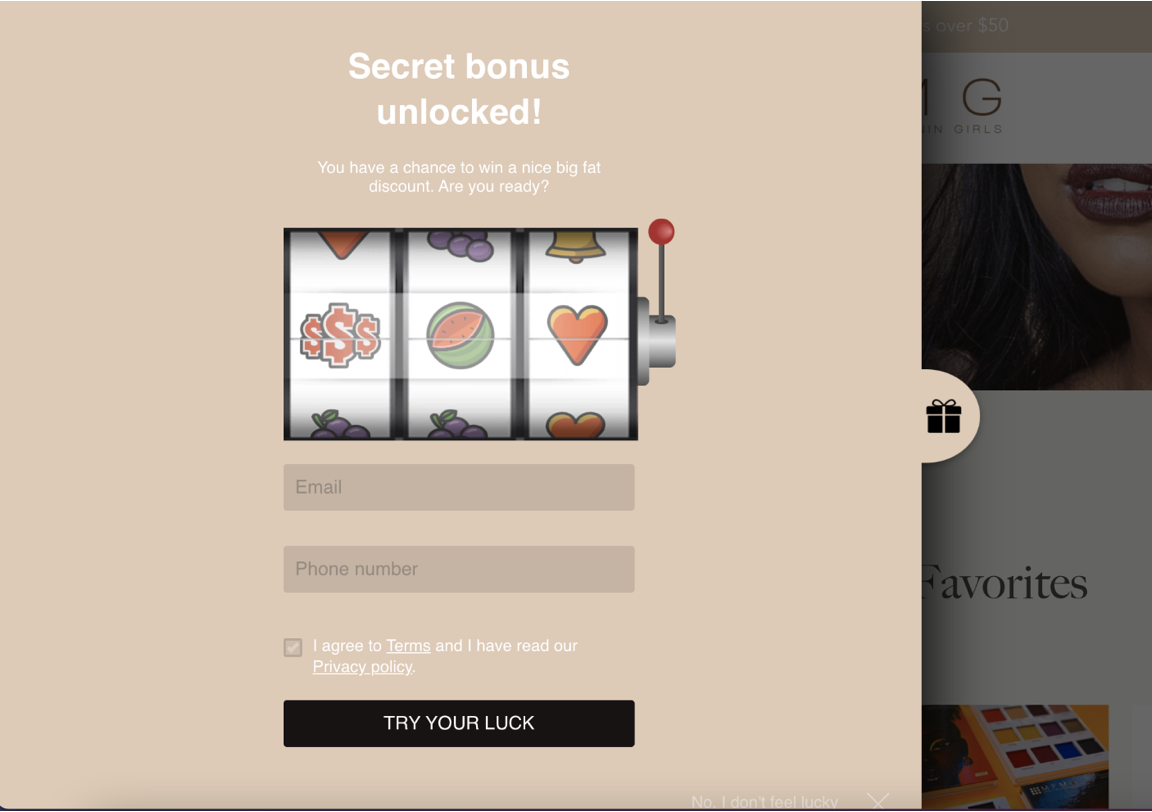
4. Get started with these templates
Building an engaged list of subscribers should be a top priority for any online merchant. If you’re unsure where to start, using pre-made templates can save time and improve results.
For more ideas and inspiration to help grow your own list, make sure to check out some of our best email popup examples!
Kickstart your growth with these ready-to-use templates:
FAQ
What is an email newsletter?
An email newsletter is a digital communication sent to a list of subscribers who have opted in to receive updates, insights, helpful content, or other information from a business. Email newsletters are typically distributed on a regular schedule and are designed to inform, engage, or entertain the audience while promoting community and brand loyalty.
Why are email newsletters important?
Email newsletters are crucial for maintaining and deepening relationships with your audience. They allow for direct, personalized communication, help drive engagement and traffic to your website, and can significantly improve customer retention and conversion rates. Email newsletters also provide a platform to showcase your expertise, share valuable content, and build trust with your newsletter subscribers.
What content should go in a newsletter?
Newsletter content can vary widely but should always align with your email subscribers’ interests and your brand’s goals. Consider including industry insights, tips, and how-tos. Share news, product updates, upcoming events, customer stories, and exclusive offers. Engaging and diverse content will keep your newsletter fresh and your readers engaged.
How do you make a newsletter fun?
To make a newsletter fun, inject your company’s personality into the copy, use humor where appropriate, and include interactive content like quizzes or polls. Visuals such as GIFs, memes, and vibrant images can also add a playful touch. Personal stories or behind-the-scenes content can make your newsletter feel more intimate and engaging.
How can I spice up my newsletter?
Spicing up your newsletter can involve experimenting with creative newsletter ideas, such as video newsletters, Q&A sessions, or featuring guest contributors. Adding exclusive content, like sneak peeks or subscriber-only offers, can also make your newsletter more appealing. Don’t forget the power of personalization and segmentation to make each message feel tailor-made.
How to write a newsletter that performs?
Writing a high-performing newsletter involves understanding your audience’s interests and needs, delivering valuable and relevant content, and maintaining a consistent tone and branding. Start with a compelling and catchy subject line, use engaging and concise copy, include a clear call-to-action (CTA), and segment your audience for personalization. Testing different elements and analyzing performance metrics can help refine your strategy over time.
What should I do if my newsletter engagement starts to decline?
If engagement drops, reassess your content strategy, gather feedback from your readers to understand their current interests and preferences, and experiment with different types of content and sending times. Sometimes, a fresh approach or a new type of content can reinvigorate your email subscribers’ interest.
Wrapping up
When it comes to engaging your customers via email, the opportunities are endless and there’s no shortage of newsletter ideas out there.
However, many brands fail to capitalize on all the types of creative campaigns available to them.
Hopefully, our list inspired you to come up with a few fresh campaigns and fill your content calendar for the upcoming months.
Learn more
Looking for more tactics that can boost your email marketing results? Check out these articles:
Migration has never been easier
We made switching a no-brainer with our free, white-glove onboarding service so you can get started in the blink of an eye.
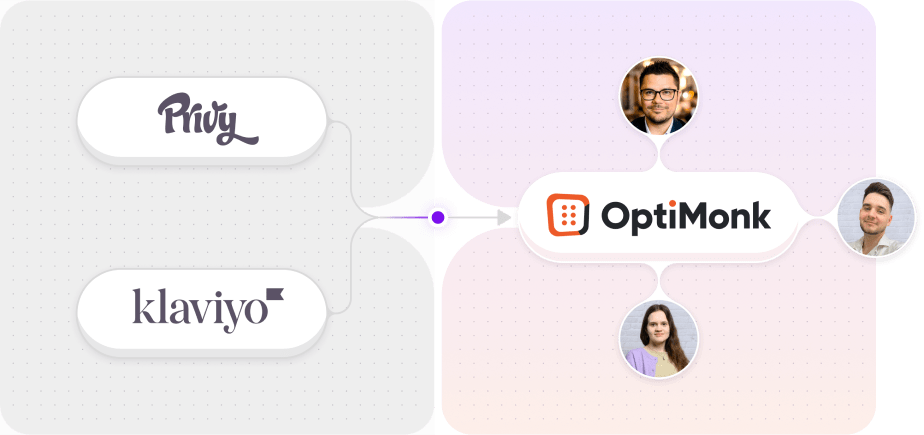
What should you do next?
Thanks for reading till the end. Here are 4 ways we can help you grow your business:
Boost conversions with proven use cases
Explore our Use Case Library, filled with actionable personalization examples and step-by-step guides to unlock your website's full potential. Check out Use Case Library
Create a free OptiMonk account
Create a free OptiMonk account and easily get started with popups and conversion rate optimization. Get OptiMonk free
Get advice from a CRO expert
Schedule a personalized discovery call with one of our experts to explore how OptiMonk can help you grow your business. Book a demo
Join our weekly newsletter
Real CRO insights & marketing tips. No fluff. Straight to your inbox. Subscribe now
Nikolett Lorincz
- Posted in
- Marketing
Partner with us
- © OptiMonk. All rights reserved!
- Terms of Use
- Privacy Policy
- Cookie Policy
Product updates: January Release 2025




